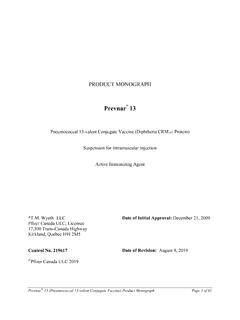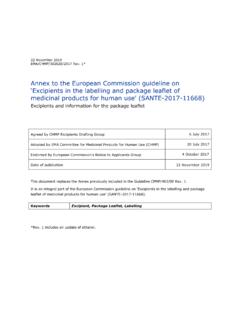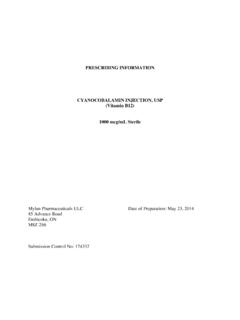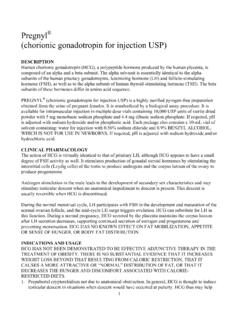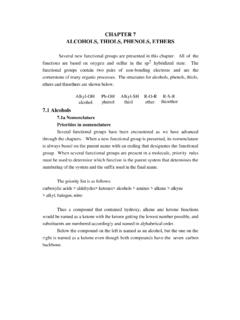Transcription of DEPO-TESTOSTERONE - Pfizer Canada
1 DEPO-TESTOSTERONE Product Monograph Page 1 of 20 PRODUCT MONOGRAPH DEPO-TESTOSTERONE testosterone cypionate injection 100 mg/mL sterile solution USP Androgens Pfizer Canada Inc. 17, 300 Trans- Canada Highway Kirkland, Quebec H9J 2M5 Date of Revision: 12 July 2018 Submission Control No: 217239 Pfizer Canada Inc., 2018 DEPO-TESTOSTERONE Product Monograph Page 2 of 20 Table of Contents PART I: HEALTH PROFESSIONAL INFORMATION ..3 SUMMARY PRODUCT INFORMATION ..3 INDICATIONS AND CLINICAL USE ..3 CONTRAINDICATIONS ..4 DOSAGE FORMS, COMPOSITION AND PACKAGING ..4 WARNINGS AND PRECAUTIONS ..4 ADVERSE REACTIONS ..8 DRUG INTERACTIONS ..9 DOSAGE AND ADMINISTRATION ..10 OVERDOSAGE ..11 ACTION AND CLINICAL PHARMACOLOGY ..12 STORAGE AND STABILITY ..13 SPECIAL HANDLING INSTRUCTIONS ..14 DOSAGE FORMS, COMPOSITION AND PACKAGING ..14 PART II: SCIENTIFIC INFORMATION ..15 PHARMACEUTICAL INFORMATION ..15 CLINICAL TRIALS.
2 15 TOXICOLOGY ..16 REFERENCES ..17 PART III: CONSUMER DEPO-TESTOSTERONE Product Monograph Page 3 of 20 DEPO-TESTOSTERONE testosterone cypionate injection PART I: HEALTH PROFESSIONAL INFORMATION SUMMARY PRODUCT INFORMATION Route of Administration Dosage Form / Strength Clinically Relevant Nonmedicinal Ingredients Intramuscular Sterile injection, 100 mg/mL benzyl alcohol, benzyl benzoate, cottonseed oil For a complete listing see Dosage Forms, Composition and Packaging section. INDICATIONS AND CLINICAL USE DEPO-TESTOSTERONE (testosterone cypionate injection) is indicated for testosterone replacement therapy in adult males for conditions associated with a deficiency or absence of endogenous testosterone (hypogonadism). DEPO-TESTOSTERONE (testosterone cypionate injection) should not be used to treat non-specific symptoms suggestive of hypogonadism if testosterone deficiency has not been demonstrated and if other etiologies responsible for the symptoms have not been excluded.
3 Testosterone deficiency should be clearly demonstrated by clinical features and confirmed by two separate validated biochemical assays (morning testosterone) before initiating therapy with any testosterone replacement, including DEPO-TESTOSTERONE treatment. Safety and efficacy of DEPO-TESTOSTERONE (testosterone cypionate injection) in men with age-related hypogonadism (also referred to as late-onset hypogonadism ) have not been established. Geriatrics (> 65 years of age): There are no controlled clinical trial data to support the use of DEPO-TESTOSTERONE in the geriatric population (see WARNINGS AND PRECAUTIONS Special Populations, Geriatrics, and CLINICAL TRIALS). Pediatrics (< 18 years of age): DEPO-TESTOSTERONE is not indicated for use in children < 18 years of age since safety and efficacy have not been established in this patient population (see WARNINGS AND PRECAUTIONS Special Populations, Pediatrics). DEPO-TESTOSTERONE Product Monograph Page 4 of 20 CONTRAINDICATIONS DEPO-TESTOSTERONE is not indicated for use in women, especially during pregnancy as its use is known to cause virilization of the external genitalia of the female fetus (see WARNINGS AND PRECAUTIONS Special Populations).
4 Androgens are contraindicated in men with known or suspected carcinoma of the prostate or breast. DEPO-TESTOSTERONE should not be used in patients with known hypersensitivity to any of its ingredients, including testosterone that is chemically synthesized from soy. For a complete listing, see DOSAGE FORMS, COMPOSITION AND PACKAGING. WARNINGS AND PRECAUTIONS General There are no controlled clinical trial data with testosterone cypionate injection in the geriatric male (> 65 years of age) to support the efficacy and safety of prolonged use. Impacts to prostate and cardiovascular event rates and patient important outcomes are unknown. DEPO-TESTOSTERONE should not be used to attempt to enhance athletic performance, or alter body composition. Efficacy and safety of DEPO-TESTOSTERONE use for such purposes have not been established. Patients should be counselled concerning the serious long-term deleterious health issues that are associated with testosterone and anabolic steroid abuse.
5 (See WARNINGS AND PRECAUTIONS; Addiction, Abuse, Misuse and also WARNINGS AND PRECAUTIONS; Dependence) If testosterone deficiency has not been established, testosterone replacement therapy should not be used for the treatment of sexual dysfunction. Clinical studies have not established testosterone replacement therapy as a treatment for male infertility. DEPO-TESTOSTERONE contains benzyl alcohol. The preservative benzyl alcohol has been associated with serious adverse events, including the gasping syndrome , and death in pediatric patients. Premature and low-birth weight infants may be more likely to develop toxicity. Testosterone cypionate should not be used interchangeably with testosterone propionate because of differences in the duration of action. Addiction, Abuse and Misuse DEPO-TESTOSTERONE contains testosterone, a Schedule G controlled substance as defined by the Food and Drugs Act. DEPO-TESTOSTERONE Product Monograph Page 5 of 20 Testosterone has been subject to abuse, typically at doses higher than recommended for the approved indication and in combination with other anabolic androgenic steroids.
6 Anabolic androgenic steroid abuse can lead to serious adverse effects, including psychiatric effects and effects on the cardiovascular system, which may be fatal (see OVERDOSAGE, Chronic overdosage caused by abuse). If testosterone abuse is suspected, serum testosterone concentrations should be checked to ensure they are within therapeutic range. However, testosterone levels may be in the normal or subnormal range in men abusing synthetic testosterone derivatives. Carcinogenesis and Mutagenesis Please see also TOXICOLOGY, Human Data. Prostatic: Geriatric patients treated with androgens may be at an increased risk for the development of prostatic hyperplasia and prostatic carcinoma (see Special Populations Geriatrics). Breast: Patients using long-term testosterone replacement therapy may be at an increased risk for the development of breast cancer. Hepatic: Prolonged use of high doses of orally active 17- alkyl-androgens ( methyltestosterone) has been associated with serious hepatic effects (peliosis hepatis, hepatic neoplasms, cholestatic hepatitis, and jaundice).
7 Peliosis hepatis can be a life-threatening or fatal complication. Long-term therapy with intramuscular administration of testosterone enanthate, which elevates blood levels for prolonged periods, has produced multiple hepatic adenomas. Skeletal: Patients with skeletal metastases are at risk of exacerbating hypercalcemia/hypercalciuria with concomitant androgen therapy. Cardiovascular Testosterone may increase blood pressure and should be used with caution in patients with hypertension. Edema, with or without congestive heart failure, may be a serious complication in patients with pre-existing cardiac, renal or hepatic disease. Diuretic therapy may be required, in addition to discontinuation of the drug. Some post-market studies suggest increased risk of serious cardiovascular events such as myocardial infarction and stroke associated with testosterone therapy. Patients should be informed of this possible risk when deciding whether to use or to continue to use DEPO-TESTOSTERONE (testosterone cypionate injection).
8 Before starting testosterone therapy, patients should be assessed for any cardiovascular risk factors ( existing ischaemic heart disease) or prior history of cardiovascular events ( myocardial infarction, stroke, or heart failure). Patients should also be closely monitored for possible serious cardiovascular events while on testosterone therapy. If any of these serious adverse events are suspected, treatment with DEPO-TESTOSTERONE should be discontinued and appropriate assessment and management initiated. DEPO-TESTOSTERONE Product Monograph Page 6 of 20 Dependence Individuals taking supratherapeutic doses of testosterone may experience withdrawal symptoms lasting for weeks or months which include depressed mood, major depression, fatigue, craving, restlessness, irritability, anorexia, insomnia, decreased libido and hypogonadotropic hypogonadism. Drug dependence in individuals using approved doses of testosterone for approved indications has not been documented.
9 Endocrine and Metabolism Androgens have been shown to alter glucose tolerance tests. Diabetics should be followed carefully and the insulin or oral hypoglycemic dosage adjusted accordingly (see DRUG INTERACTIONS - Drug-Drug Interactions). Hypercalciuria/hypercalcemia (caused by malignant tumours) may be exacerbated by androgen treatment. Androgens should be used with caution in cancer patients at risk of hypercalcemia (and associated hypercalciuria). Regular monitoring of serum calcium concentrations is recommended in patients at risk of hypercalciuria/hypercalcemia. Hypercalcemia may occur in immobilized patients. If this occurs, the drug should be discontinued. Hematologic Hemoglobin and hematocrit levels should be checked periodically (to detect polycythemia) in patients on long-term androgen therapy (see Monitoring and Laboratory Tests). Alkylated derivatives of testosterone such as methandrostenolone, have been reported to decrease the anticoagulant requirement of patients receiving oral anticoagulants ( warfarin).
10 Patients receiving oral anticoagulant therapy require close monitoring, especially when androgens are started or stopped (see DRUG INTERACTIONS - Drug-Drug Interactions). Ophthalmologic Testosterone treatment can cause chorioretinopathy. Chorioretinopathy can lead to visual disturbances. Respiratory The treatment of hypogonadal men with testosterone may potentiate sleep apnea in some patients, particularly for those with risk factors such as obesity or chronic lung diseases. Sexual Function/Reproduction Gynecomastia may frequently develop and occasionally persists in patients being treated for hypogonadism. Priapism or excessive sexual stimulation may develop. Oligospermia may occur after prolonged administration or excessive dosage. DEPO-TESTOSTERONE Product Monograph Page 7 of 20 Skin Inflammation and pain at the site of intramuscular injection may occur. Special Populations Pregnant Women: DEPO-TESTOSTERONE should not be used in pregnant women.


